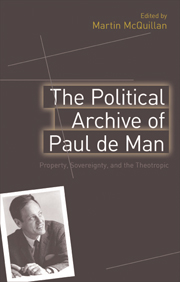Book contents
- Frontmatter
- Contents
- List of Abbreviations
- Acknowledgements
- Notes on Contributors
- Introduction: Broken Promises: Rousseau, de Man and Watergate
- 1 Lovence in Rousseau's Julie ou la Nouvelle Héloïse
- 2 Reading Spectacles in Rousseau's Letter to d'Alembert
- 3 The Utter Misery of the Human Mind: Apotropaic and Theotropic in de Man's Rousseau
- 4 Rhetoric and Rausch: de Man on Nietzsche on Value and Style
- 5 Theotropic Logology: J. Hillis Miller, Paul de Man and Kenneth Burke
- 6 Normativity, Materiality and Inequality: The Politics of the Letter in Paul de Man
- 7 Inscribing the Political: Paul de Man and the Wild Art of Letter Writing
- 8 Mistake in Paul de Man: Violent Reading and Theotropic Violence
- 9 Lightstruck: ‘Hegel on the Sublime’
- 10 De Man vs. ‘Deconstruction’: or, Who, Today, Speaks for the Anthropocene?
- 11 Paul de Man at Work: What Good is an Archive?
- 12 DNA: de Man's Nucleic Archive
- 13 Sovereign Debt Crisis: Paul de Man and the Privatization of Thought
- Appendix: Nietzsche I: Rhetoric + Metaphysics
- Index
1 - Lovence in Rousseau's Julie ou la Nouvelle Héloïse
Published online by Cambridge University Press: 05 August 2013
- Frontmatter
- Contents
- List of Abbreviations
- Acknowledgements
- Notes on Contributors
- Introduction: Broken Promises: Rousseau, de Man and Watergate
- 1 Lovence in Rousseau's Julie ou la Nouvelle Héloïse
- 2 Reading Spectacles in Rousseau's Letter to d'Alembert
- 3 The Utter Misery of the Human Mind: Apotropaic and Theotropic in de Man's Rousseau
- 4 Rhetoric and Rausch: de Man on Nietzsche on Value and Style
- 5 Theotropic Logology: J. Hillis Miller, Paul de Man and Kenneth Burke
- 6 Normativity, Materiality and Inequality: The Politics of the Letter in Paul de Man
- 7 Inscribing the Political: Paul de Man and the Wild Art of Letter Writing
- 8 Mistake in Paul de Man: Violent Reading and Theotropic Violence
- 9 Lightstruck: ‘Hegel on the Sublime’
- 10 De Man vs. ‘Deconstruction’: or, Who, Today, Speaks for the Anthropocene?
- 11 Paul de Man at Work: What Good is an Archive?
- 12 DNA: de Man's Nucleic Archive
- 13 Sovereign Debt Crisis: Paul de Man and the Privatization of Thought
- Appendix: Nietzsche I: Rhetoric + Metaphysics
- Index
Summary
De Man's chapter on Julie in Allegories of Reading is not only a central moment in the economy of the book, where the key hermeneutic category (the ‘allegory’) becomes illustrated and justified, it is also a brilliant interpretation of the problem of ‘passion’ as a point of superposition of epistemology and ethics that, every attentive reader would probably agree, forms the objective and the crucial interest of the philosophical novel. In my attempt at making sense of the stylistic and theoretical intricacies of La Nouvelle Héloïse, I draw particularly on two of de Man's insights. The first one says that ‘passion is not something which, like the senses, belongs in proper to an entity or to a subject but, like music, it is the system of relationships that exists only in the terms of this system …’ (AR 210): hence it is a relational notion. This also means that ‘love’ (in its ever changing modalities) and the correlative other passions must be described and discussed for the clarity (however imperfect) that they can bring to a logical reflection on the nature of ‘relations’ as such. Another important aspect of de Man's commentary is the very introduction of the category ‘allegory’ as a ‘narrative of the second degree’ (AR 205), which not only includes a deconstruction of its own realistic reading, but suspends the possibility of dissociating fiction from reasoning as if judging from a vantage point situated outside the text and exercising critical power over it.
- Type
- Chapter
- Information
- The Political Archive of Paul de ManProperty, Sovereignty and the Theotropic, pp. 13 - 24Publisher: Edinburgh University PressPrint publication year: 2012

